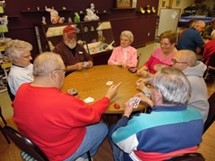 A card party at the Berlin Senior Center
A card party at the Berlin Senior Center
Overall wellness, especially for older people, can be a little harder to maintain during the winter months than during warmer times of the year. We spoke to staff at some senior centers around the state, who gave us some good advice for winter well-being. They agreed about a handful of general tips:
- Make sure flu and COVID vaccinations and boosters are up to date.
- Drink plenty of water. Cold air and indoor furnace systems can cause dehydration.
- Eat well. This sounds obvious, but so-called “comfort food” can lack nutritional value. Meals should contain fruits, whole grains, and vegetables.
- Make sure the day includes exercise or movement of some kind.
- Stay connected. Cold weather has a way of keeping people in the house and out of normal social circles.
Cindy McGlynn is the Director of the Stoughton Senior Center. She stays especially watchful for seniors who are not socializing. “Any kind of isolation and you run the risk of depression,” Cindy says. But there are other risk outcomes as well. “Maybe people are not going to the doctor the way they should,” Cindy notes. “Isolation can be very detrimental for older adults.” The Center prioritizes socialization to the point where they have a team of volunteers who make home visits just to stop by to chat or play a card game.
Illness can trigger depression as well. According to the Centers for Disease Control and Prevention, 80 percent of older adults have at least one chronic health condition and 50 percent have two or more. Estimates of major depression in older people living in the community range from less than 1 percent to about 5 percent. But among those who require home healthcare of some sort, that number skyrockets to nearly 14%.
It’s clear that staying active is critical to wellness for seniors. Berlin Senior Center Director Rebecca Bays lists exercise at the top of her winter wellness list. “Don’t stop moving,” Rebecca says. “Sedentary is bad. You don’t have to exercise per se, but just keep moving. Make sure you’re out grocery shopping, pay a visit to a friend. Keep moving!”
Most senior centers offer a variety of programs that address both movement and social well-being. The Stoughton Senior Center, for example, has a full menu of options. “We have movie nights. Card games and dominoes,” Cindy says. “We offer a low vision support group. It’s like a little mini family that keeps connections going before and after each regular meeting.”
“We had a stretch class just this morning,” Cindy adds. “We have wellness activities, personal enrichment classes. All of which include good social interaction.”
Rebecca says an average of 20 older adults per day cycle through the Berlin Senior Center, where sheepshead, bridge, cribbage and yoga classes keep minds and bodies stimulated. The warmth of a game or exercise room on a cold winter day combines with the warmth of making new friends or keeping up with old ones.
One of the keys to maintaining winter wellness is knowing your options. “The first thing is to make sure you have all the information, that you know all the things available in your community,” Cindy says. “Are there transportation options? Are there safe ways to get there? Trying to get information can be overwhelming, but calling a senior center or community center is really helpful—and they’re there to help.”

